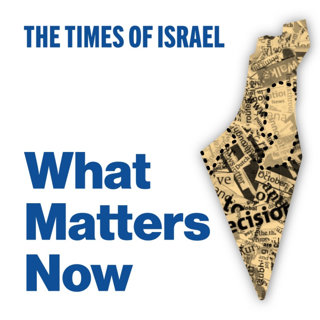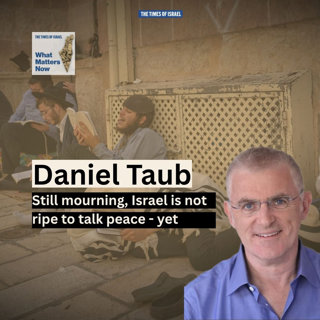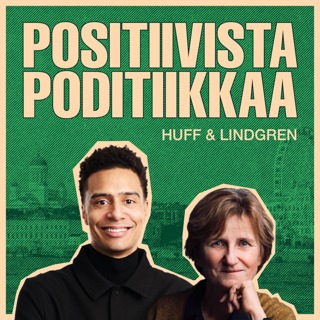
What Matters Now to Israel Story’s Mishy Harman: ‘A person is a person is a person’
Welcome to What Matters Now, a weekly podcast exploration into one key issue shaping Israel and the Jewish World — right now. This week on What Matters Now, we're again handing the mic to Mishy Harman, the co-founder of The Times of Israel’s podcast partner, Israel Story, the premiere English-language podcast from Israel. Since the October 7 massacre by Hamas of some 1,200 individuals, mostly civilians, Harman and his team at Israel Story have pivoted from their long-form, carefully nurtured episodes to producing almost daily Wartime Diaries. We at The Times of Israel asked the Israel Story team to compile a few episodes and after much deliberation, they selected three: Wartime Diaries: Rachel Goldberg and Jon Polin Rachel Goldberg and Jon Polin, the parents of 23-year-old Hersh Goldberg-Polin, who was kidnapped from the Supernova Party, have in many ways emerged as the face of the hostage families. They’ve met with US President Joe Biden and the Pope, they were on the cover of Time Magazine, and Rachel has spoken at the UN and at the March for Israel Rally in Washington, DC. In all those places, as well as in countless other interviews, speeches and meetings, they’ve told the heartbreaking tale of the two text messages Hersh sent on the morning of October 7, one saying, “I love you,” and the other, “I’m sorry.” He wrote those messages from within a shelter where he was hiding with 28 other partygoers. Eighteen of them were killed, and Hersh was badly wounded when his left arm was blown off. Shortly thereafter, Hersh and three others from the shelter were loaded onto Hamas pickup trucks and taken into Gaza. At recording time, it was 55 days since their abduction. Wartime Diaries: Datya Itzhaki In the summer of 2005, Israel unilaterally withdrew from Gaza under the leadership of premier Ariel Sharon. The roughly 8,000 residents of the 21 Jewish settlements within the Gaza Strip were forced to leave their homes and their communities, which for decades they had actually been encouraged and incentivized to inhabit. The move brought the country to the brink of a civil war. This was especially palpable in the tense relations between the residents of Gush Katif (as the main block of Gaza settlements was known) and their neighbors from the other side of the fence — the largely left-leaning residents of the same kibbutzim that 18 years later suffered most in the October 7 Hamas atrocities. Now, many of the former residents of the Gaza settlements who never stopped dreaming of returning to the sand dunes of the Strip feel at least partially vindicated. Had their communities not been dismantled back in 2005, they claim, the army would have still been in Gaza, and none of this calamity would have occurred. One such voice is that of 63-year-old Datya Itzhaki, who used to live in the Gush Katif settlement of Kfar Yam. Wartime Diaries: Sahar Vardi During this terrible moment, many people can’t make space for anyone else’s pain -- and that’s understandable. But for those who are open to it, Israel Story’s motto is that everybody's story matters. Without pointing fingers or making equivalencies, we're trying to stay true to our mission of sharing stories from different perspectives to complicate, humanize, and insert shades of nuance into what can often feel like a black-and-white, us-versus-them reality. In our 21st diary, we hear from Sahar Vardi, a Jewish-Israeli peace activist who lost a dear friend, Khalil Abu Yahia, in Gaza. So this week, we ask Mishy Harman, what matters now? What Matters Now podcasts are available for download on iTunes, TuneIn, Pocket Casts, Stitcher, PlayerFM or wherever you get your podcasts. IMAGE: What Matters Now hosts the Israel Story podcast, with three episodes featuring: Rachel Goldberg and Jon Polin (upper right), Datya Itzhaki (lower left) and Sahar Vardi. (Courtesy)See omnystudio.com/listener for privacy information.
7 Joulu 20231h 7min

What Matters Now to Saul Singer: Refounding Israel the day after the war
Welcome to What Matters Now, a weekly podcast exploration into one key issue shaping Israel and the Jewish World — right now. For Israelis, there is before October 7 and after. So the idea of a book called “The Genius of Israel: The Surprising Resilience of a Divided Nation in a Turbulent World” written during those “before” times may not feel like the most relevant reading material. But it is. “Start-Up Nation” authors Saul Singer and Dan Senor have again joined forces to dissect what makes Israelis tick — and keep on ticking. One conclusion? It’s all about the unity of purpose. If that unity was once what made us strong, well, “Now it’s become existential. If we don’t stay unified, we’re just going to go into a downward spiral,” says co-author Saul Singer. So this week, we speak with bestselling author Saul Singer and find out, what matters now. What Matters Now podcasts are available for download on iTunes, TuneIn, Pocket Casts, Stitcher, PlayerFM or wherever you get your podcasts. Image: 'The Genius of Israel' co-author Saul Singer. (courtesy)See omnystudio.com/listener for privacy information.
30 Marras 202326min

What Matters Now to Rabbi Seth Farber: Hostages and mixed burials in Jewish law
Welcome to What Matters Now, a weekly podcast exploration into one key issue shaping Israel and the Jewish World — right now. Several entire families were slaughtered during the Hamas onslaught on southern Israel on October 7 which left 1,200 dead. They were killed by terrorists together, so why shouldn’t a father, mother and their children be buried together? When the father is not Jewish, the question becomes more complicated, at least in the Jewish state. "In today’s modern state of Israel, we need a new tool kit in many ways. It doesn’t have to deny Halacha, it doesn’t have to ignore it, it doesn’t have to say it’s irrelevant, it just has to find those moments in Jewish legal history that enable us to live together with our communities,” said Rabbi Seth Farber, the head of ITIM on Thursday. ITIM is an organization that helps Israelis navigate the country’s religious bureaucracy. In its mission statement, the NGO says it is committed to increasing participation in Jewish life by making Israel’s religious establishment respectful of and responsive to the diverse Jewish needs of the Jewish people. During this current war with Hamas, ITIM found itself helping on the issue of burials for those who are not considered halachically Jewish, as well as the idea of preemptively preventing anchored women, the wives of soldiers who may be taken captive. So this week we hear from Rabbi Seth Farber, what matters now. What Matters Now podcasts are available for download on iTunes, TuneIn, Pocket Casts, Stitcher, PlayerFM or wherever you get your podcasts. iMAGE: ITIM head Rabbi Seth Farber (courtesy)See omnystudio.com/listener for privacy information.
23 Marras 202330min

What Matters Now to Dr. Joe Uziel: ID'ing Oct. 7 victims via forensic archaeology
Welcome to What Matters Now, a weekly podcast exploration into one key issue shaping Israel and the Jewish World — right now. The destruction wrought by Hamas on October 7 at the small Israeli communities surrounding the Gaza border was so complete that in many cases, only microscopic remnants of those 1,200 who were killed there can be found today. The Israel Antiquities Authority is accustomed to searching for such human remains — albeit for people who lived hundreds, if not thousands of years ago. Today, some 30 volunteers from the IAA are working in shifts, sifting through the rubble — in Be’eri, in Kfar Aza, in the cars that were torched fleeing the Supernova rave. “We're searching for things that are so small that if it's not using archaeological methodologies, they're not possible to be found,” the IAA's Dead Sea Scrolls unit head Dr. Joe Uziel told The Times of Israel this week. He honed his CSI skills on, for example, remains of the Babylonian conquest in Jerusalem’s City of David. Today, he is volunteering to help identify those killed near Gaza with the same techniques. The team of volunteers has so far found the remains of some 60 people who were killed. But identifying who they are is difficult because some of the small bone fragments are from the terrorists that came into the kibbutzim, others are from foreign workers and young children whose DNA is not on file. So this week, archaeologist Dr. Joe Uziel tells us, what matters now. What Matters Now podcasts are available for download on iTunes, TuneIn, Pocket Casts, Stitcher, PlayerFM or wherever you get your podcasts. IMAGE: IAA archaeologist Dr. Joe Uziel (left) in a home destroyed by Hamas during its murderous rampage on October 7, 2023, sifting through the rubble in search of human remains. (Shai Halevi/Israel Antiquities Authority)See omnystudio.com/listener for privacy information.
16 Marras 202327min



















